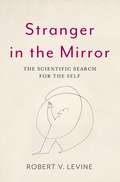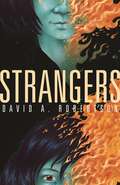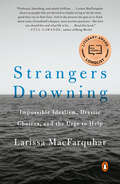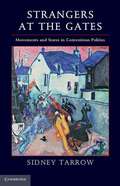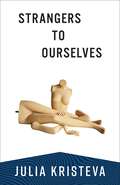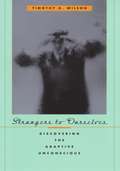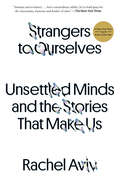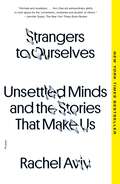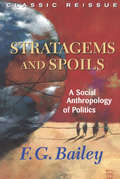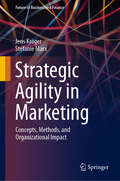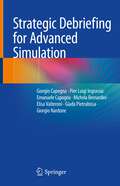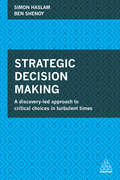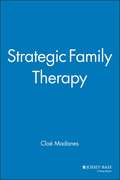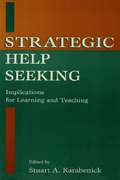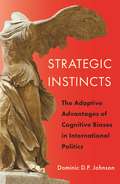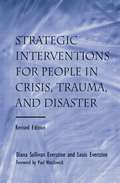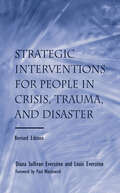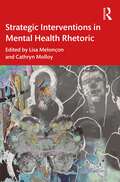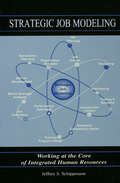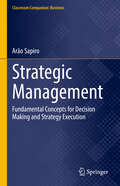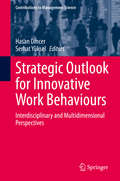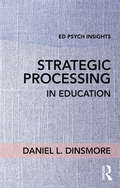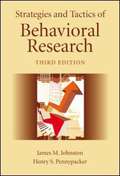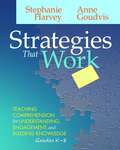- Table View
- List View
Stranger in the Mirror: The Scientific Search for the Self
by Robert V. LevineIn Stranger in the Mirror, Robert Levine offers a provocative and entertaining scientific exploration of the most personal and important of all landscapes: the physical and psychological entity we call our self. Who are we? Where is the boundary between us and everything else? Are we all multiple personalities? And how can we control who we become?Levine tackles these and other questions with a combination of surprising stories, case studies, and cutting-edge research--from psychology, biology, neuroscience, virtual reality, and many other fields. The result challenges cherished beliefs about the unity and stability of the self--but also suggests that we are more capable of change than we know.Transformation, Levine shows, is the human condition at virtually every level. Physically, our cells are unrecognizable from one moment to the next. Cognitively, our self-perceptions are equally changeable: A single glitch can make us lose track of a body part or our entire body--or to confuse our very self with that of another person. Psychologically, we switch back and forth like quicksilver between incongruent, sometimes adversarial subselves. Socially, we appear to be little more than an ever-changing troupe of actors. And, culturally, the boundaries of the self vary wildly around the world--from the confines of one's body to an entire village.The self, in short, is a fiction--vague, arbitrary, and utterly intangible. But it is also interminably fluid. And this, Levine argues, unleashes a world of potential. Fluidity creates malleability. And malleability creates possibilities.Engaging, informative, and ultimately liberating, Stranger in the Mirror will change forever how you think about your self--and what you might become.
Strangers (The Reckoner)
by David A. RobertsonA talking coyote, mysterious illnesses, and girl trouble. Coming home can be murder...When Cole Harper gets a mysterious message from an old friend begging him to come home, he has no idea what he's getting into. Compelled to return to Wounded Sky First Nation, Cole finds his community in chaos: a series of shocking murders, a mysterious illness ravaging the residents, and reemerging questions about Cole&’s role in the tragedy that drove him away 10 years ago. With the aid of an unhelpful spirit, a disfigured ghost, and his two oldest friends, Cole tries to figure out his purpose, and unravel the mysteries he left behind a decade ago. Will he find the answers in time to save his community?
Strangers (The Reckoner)
by David A. RobertsonA talking coyote, mysterious illnesses, and girl trouble. Coming home can be murder...When Cole Harper gets a mysterious message from an old friend begging him to come home, he has no idea what he's getting into. Compelled to return to Wounded Sky First Nation, Cole finds his community in chaos: a series of shocking murders, a mysterious illness ravaging the residents, and reemerging questions about Cole&’s role in the tragedy that drove him away 10 years ago. With the aid of an unhelpful spirit, a disfigured ghost, and his two oldest friends, Cole tries to figure out his purpose, and unravel the mysteries he left behind a decade ago. Will he find the answers in time to save his community?
Strangers Drowning: Grappling with Impossible Idealism, Drastic Choices, and the Overpowering Urge to Help
by Larissa MacfarquharWhat does it mean to devote yourself wholly to helping others? In Strangers Drowning, Larissa MacFarquhar seeks out people living lives of extreme ethical commitment and tells their deeply intimate stories; their stubborn integrity and their compromises; their bravery and their recklessness; their joys and defeats and wrenching dilemmas. A couple adopts two children in distress. But then they think: If they can change two lives, why not four? Or ten? They adopt twenty. But how do they weigh the needs of unknown children in distress against the needs of the children they already have? Another couple founds a leprosy colony in the wilderness in India, living in huts with no walls, knowing that their two small children may contract leprosy or be eaten by panthers. The children survive. But what if they hadn't? How would their parents' risk have been judged? A woman believes that if she spends money on herself, rather than donate it to buy life-saving medicine, then she's responsible for the deaths that result. She lives on a fraction of her income, but wonders: when is compromise self-indulgence and when is it essential? We honor such generosity and high ideals; but when we call people do-gooders there is skepticism in it, even hostility. Why do moral people make us uneasy? Between her stories, MacFarquhar threads a lively history of the literature, philosophy, social science, and self-help that have contributed to a deep suspicion of do-gooders in Western culture. Through its sympathetic and beautifully vivid storytelling, Strangers Drowning confronts us with fundamental questions about what it means to be human. In a world of strangers drowning in need, how much should we help, and how much can we help? Is it right to care for strangers even at the expense of those we are closest to? Moving and provocative, Strangers Drowning challenges us to think about what we value most, and why.From the Hardcover edition.
Strangers at the Gates: Movements and States in Contentious Politics
by Sidney TarrowPlaces social movements in the broader arena of contentious politics in relation to states, political parties and other actors.
Strangers to Ourselves (European Perspectives: A Series in Social Thought and Cultural Criticism)
by Julia KristevaThis book is concerned with the notion of the stranger—the foreigner, outsider, or alien in a country and society not their own—as well as the notion of strangeness within the self, a person’s deep sense of being, as distinct from outside appearance and their conscious idea of self.Julia Kristeva begins with the personal and moves outward by examining world literature and philosophy. She discusses the foreigner in Greek tragedy, in the Bible, and in the literature of the Middle Ages, Renaissance, Enlightenment, and the twentieth century. By considering the legal status of foreigners throughout history, Kristeva offers a different perspective on our own civilization.
Strangers to Ourselves: Discovering the Adaptive Unconscious
by Timothy D. WilsonKnow thyself, a precept as old as Socrates, is still good advice. But is introspection the best path to self-knowledge? Wilson makes the case for better ways of discovering our unconscious selves. If you want to know who you are or what you feel or what you're like, Wilson advises, pay attention to what you actually do and what other people think about you. Showing us an unconscious more powerful than Freud's, and even more pervasive in our daily life, Strangers to Ourselves marks a revolution in how we know ourselves.
Strangers to Ourselves: Unsettled Minds and the Stories That Make Us
by Rachel AvivThe highly anticipated debut from the acclaimed award-winning New Yorker writer Rachel Aviv compels us to examine how the stories we tell about mental illness shape our sense of who we are.Strangers to Ourselves poses fundamental questions about how we understand ourselves in periods of crisis and distress. Drawing on deep, original reporting as well as unpublished journals and memoirs, Rachel Aviv writes about people who have come up against the limits of psychiatric explanations for who they are. She follows an Indian woman celebrated as a saint who lives in healing temples in Kerala; an incarcerated mother vying for her children's forgiveness after recovering from psychosis; a man who devotes his life to seeking revenge upon his psychoanalysts; and an affluent young woman who, after a decade of defining herself through her diagnosis, decides to go off her meds because she doesn't know who she is without them. Animated by a profound sense of empathy, Aviv's gripping exploration is refracted through her own account of living in a hospital ward at the age of six and meeting a fellow patient with whom her life runs parallel—until it no longer does.Aviv asks how the stories we tell about mental disorders shape their course in our lives—and our identities, too. Challenging the way we understand and talk about illness, her account is a testament to the porousness and resilience of the mind.
Strangers to Ourselves: Unsettled Minds and the Stories That Make Us
by Rachel AvivOne of the top ten books of the year at The New York Times Book Review, The Wall Street Journal, Vulture/New York magazineA best book of the year at Los Angeles Times, Time, NPR, The Washington Post, Bookforum, The New Yorker, Vogue, KirkusThe acclaimed, award-winning New Yorker writer Rachel Aviv offers a groundbreaking exploration of mental illness and the mind, and illuminates the startling connections between diagnosis and identity.Strangers to Ourselves poses fundamental questions about how we understand ourselves in periods of crisis and distress. Drawing on deep, original reporting as well as unpublished journals and memoirs, Rachel Aviv writes about people who have come up against the limits of psychiatric explanations for who they are. She follows an Indian woman celebrated as a saint who lives in healing temples in Kerala; an incarcerated mother vying for her children’s forgiveness after recovering from psychosis; a man who devotes his life to seeking revenge upon his psychoanalysts; and an affluent young woman who, after a decade of defining herself through her diagnosis, decides to go off her meds because she doesn’t know who she is without them. Animated by a profound sense of empathy, Aviv’s gripping exploration is refracted through her own account of living in a hospital ward at the age of six and meeting a fellow patient with whom her life runs parallel—until it no longer does.Aviv asks how the stories we tell about mental disorders shape their course in our lives—and our identities, too. Challenging the way we understand and talk about illness, her account is a testament to the porousness and resilience of the mind.
Stratagems and Spoils: A Social Anthropology of Politics
by F. G. BaileyF. G. Bailey’s classic political-anthropology text is reissued here with a Postscript that comments critically on the book’s scope, its reception, and its uses. First published in 1969, Stratagems and Spoils captured the imagination of scholars and students with a revealing examination of principles of political competition that operate alike in "exotic” and "developed” societies. In Bailey’s analysis, Swat Pathan chiefs, cosa nostra gangsters, General de Gaulle, and the Untouchables in a rural Indian village (for example) are shown employing similar strategies, both effective and ineffective, to win and hold followers while eroding the support of their opponents. Provocative and insightful, Stratagems and Spoils provides a conceptual toolkit for analyzing, in any culture, the rules that regulate political contests and determine who will win and who will lose.
Strategic Agility in Marketing: Concepts, Methods, and Organizational Impact (Future of Business and Finance)
by Jens Kröger Stefanie MarxThis book offers a comprehensive guide to establishing marketing organizations and teams based on Agile principles. By emphasizing a customer-centric mindset, flexible structures, cross-functional collaboration, and continuous success measurement, agility empowers marketing teams to strengthen customer relationships, foster innovation, and amplify organizational impact. When implemented effectively, agile marketing positions teams as true business enablers within their organizations. In light of recent global challenges—such as the pandemic, economic shifts, and rapid technological advancements—the need for adaptability has become more critical than ever. This book delves into developing an agile mindset, values, and principles while providing practical methods and tools for operationalizing agile marketing. Readers will gain insights into positioning marketing as a strategic business enabler and thriving in dynamic environments, transforming marketing into a key success factor for their organizations. Targeted at marketing professionals, business leaders, and academics, this book is an essential resource for anyone looking to leverage agility to gain a competitive edge in today&’s fast-changing world.
Strategic Debriefing for Advanced Simulation
by Giorgio Capogna Giada Pietrabissa Giorgio Nardone Elisa Valteroni Pier Luigi Ingrassia Emanuele Capogna Michela BernardiniThis book provides an in-depth and complete guide explaining how to incorporate the strategic dialogue and strategic communication methods into the debriefing after the scenario, characteristics that make it unique. After examining all the aspects that allow a correct use of the simulation, such as knowledge of models, logical schemes, use of the different simulators, planning of the didactic activities and of learning process, this practical book aims to explore the advanced technique of the strategic debriefing. It encourages not only those who are approaching this new debriefing tool but also it provides a useful update to all those who are already more familiar with the standard debriefing after simulation technique.The strategic language, an effective tool in strategic psychotherapy and business problem solving, is ideal and complementary to the standard debriefing methods, making them more performing and functional because, next to common logic, it makes use of non-ordinary logical language. The book is intended for healthcare simulation debriefers and instructors, for hospitals’ managers, university teachers and to all the physicians who are increasingly showing interest in active teaching processes with simulation.
Strategic Decision Making: A Discovery-led Approach to Critical Choices in Turbulent Times
by Simon Haslam Ben ShenoyMaking strategic decisions is a fundamental skill for leaders and managers. However, in a business environment that is in a constant state of change, making strategic decisions has never been more difficult. Strategic Decision Making addresses this challenge by providing a framework that can be used to make sound decisions in an uncertain world. Structured around the core concepts of framing, experimenting and scaling, this book will ensure that efforts are focused where the need is greatest, that interventions are tested, evaluated and revised if necessary and that successful initiatives are effectively rolled out across the business.Packed with real world examples and backed up by academic research, Strategic Decision Making will allow today's leaders and the leaders of tomorrow to make successful and defensible business choices. It shows how to: avoid decision-making bias; overcome organizational inertia; manage the difficulties of rigid organizational structures and avoid being side tracked by outdated or irrelevant experience. Essential reading for business practitioners and management students alike, this comprehensive guide provides a robust approach to achieving strategic success.
Strategic Family Therapy
by Cloe MadanesThis book offers the practicing therapist an extensive range of therapeutic interventions, a theoretical view of the family organization that makes sense of a client's problems, and practical examples as a guide to what to do.
Strategic Help Seeking: Implications for Learning and Teaching
by Stuart A. KarabenickThere is considerable agreement that more successful learners are active, engaged, and self-regulating learners who understand and are motivated to apply learning strategies under appropriate conditions. One important strategic activity is seeking help when necessary, rather than giving up or engaging in fruitless persistence. Research on strategic help seeking has matured significantly in recent years. This volume captures the current state of knowledge, research, and theory on help seeking as a strategic learning resource. It is international in scope, with contributors from the U.S., the Netherlands, Japan, and Israel. As a whole, the book suggests that strategic (adaptive) help seeking is a critical school readiness skill that is facilitated by mastery-oriented classroom achievement and social goals, by teachers who invite questions rather than those who ask them, and by cultural characteristics that support student inquiry. A conceptual overview is followed by three chapters that examine help seeking from complementary theoretical perspectives and make important distinctions between forms of help seeking; two chapters that focus on how learners' achievement and social goals affect classroom help seeking; one chapter specifically devoted to cross-cultural comparisons of help seeking in Western cultures and in Japan; two chapters that examine the most frequent manifestation of help seeking--that of question asking; and one chapter that explores help-seeking in the information age (the library reference process, information technology, and computer-mediated communication). All chapters include attention to the implications of research and theory for help seeking in instructional settings. Strategic Help Seeking is an excellent resource for educational researchers and practitioners including teachers, school administrators, instructional designers, reference librarians.
Strategic Instincts: The Adaptive Advantages of Cognitive Biases in International Politics (Princeton Studies in International History and Politics #172)
by Dominic D. Johnson"A very timely book."—Anne-Marie Slaughter, CEO of New AmericaHow cognitive biases can guide good decision making in politics and international relationsA widespread assumption in political science and international relations is that cognitive biases—quirks of the brain we all share as human beings—are detrimental and responsible for policy failures, disasters, and wars. In Strategic Instincts, Dominic Johnson challenges this assumption, explaining that these nonrational behaviors can actually support favorable results in international politics and contribute to political and strategic success. By studying past examples, he considers the ways that cognitive biases act as “strategic instincts,” lending a competitive edge in policy decisions, especially under conditions of unpredictability and imperfect information.Drawing from evolutionary theory and behavioral sciences, Johnson looks at three influential cognitive biases—overconfidence, the fundamental attribution error, and in-group/out-group bias. He then examines the advantageous as well as the detrimental effects of these biases through historical case studies of the American Revolution, the Munich Crisis, and the Pacific campaign in World War II. He acknowledges the dark side of biases—when confidence becomes hubris, when attribution errors become paranoia, and when group bias becomes prejudice. Ultimately, Johnson makes a case for a more nuanced understanding of the causes and consequences of cognitive biases and argues that in the complex world of international relations, strategic instincts can, in the right context, guide better performance.Strategic Instincts shows how an evolutionary perspective can offer the crucial next step in bringing psychological insights to bear on foundational questions in international politics.
Strategic Interventions for People in Crisis, Trauma, and Disaster: Revised Edition
by Diane Sullivan Everstine Louis EverstineStrategic Interventions for People in Crisis, Trauma, and Disaster enables therapists to walk into difficult situations with a thorough understanding of interactional dynamics and a plan of action. With the stressful turbulence of our present culture, more and more clinicians are called upon to intervene in crisis situations. Violent interactions, once considered rare or beyond the province of the therapist, have become familiar events to many practitioners. This volume provides them with both the theoretical background and practical techniques to help people learn from crisis experiences and move toward change and growth. Of special interest are practical guidelines and specific intervention strategies for conducting psychotherapy with different types of violent persons and of victims. Treatment principles for each crisis situation are then illustrated in detailed case studies. As the authors demonstrate, with these troubled people a therapist must be ready to make quick decisions, draw upon all available resources from the family and community, and offer continuing support as traumas are worked through and new behavior patterns are learned. In addition, the authors discuss the legal and ethical responsibilities of the therapist.
Strategic Interventions for People in Crisis, Trauma, and Disaster: Revised Edition
by Diane Sullivan Everstine Louis EverstineStrategic Interventions for People in Crisis, Trauma, and Disaster enables therapists to walk into difficult situations with a thorough understanding of interactional dynamics and a plan of action. With the stressful turbulence of our present culture, more and more clinicians are called upon to intervene in crisis situations. Violent interactions, once considered rare or beyond the province of the therapist, have become familiar events to many practitioners. This volume provides them with both the theoretical background and practical techniques to help people learn from crisis experiences and move toward change and growth. Of special interest are practical guidelines and specific intervention strategies for conducting psychotherapy with different types of violent persons and of victims. Treatment principles for each crisis situation are then illustrated in detailed case studies. As the authors demonstrate, with these troubled people a therapist must be ready to make quick decisions, draw upon all available resources from the family and community, and offer continuing support as traumas are worked through and new behavior patterns are learned. In addition, the authors discuss the legal and ethical responsibilities of the therapist.
Strategic Interventions in Mental Health Rhetoric
by Lisa MelonçonOffering rhetorically informed strategic interventions, this innovative collection moves beyond critiques of mental health issues, problems, and care. With sections that focus on methodological, cultural and legal, and pedagogical interventions, readers will find an engaging discussion of a discrete mental health phenomenon as well as a clear interventional takeaway in each chapter. Contributors make use of critical discourse analyses, ethnographic inquiries, autoethnographic inquiries, case studies, and textual analyses to engage such mental health research topics as postpartum depression among Chinese mothers; insanity pleas; anosognosia; issues of intimacy, access, and embodiment in research projects; community support groups; Black mental health; women in Alcoholics Anonymous; and mental health in faculty workshops and university online health tools. The authors and editors create scholarship on mental health that explicitly builds productive methodological, theoretical, and practical bridges among scholars and teachers in the various specialties of writing and communication. This collection will interest scholars, students, and practitioners in health and medical humanities; rhetoric of health and medicine; health communication; medical anthropology; scientific and technical communication; disability studies; and rhetorical studies generally.
Strategic Job Modeling: Working at the Core of Integrated Human Resources
by Jeffery S. Schippmann(USE FOR PRACTITIONER/BUSINESS PIECES) In an increasingly knowledge-based economy, a company's success hinges on the quality of its people. People set strategy, make decisions, build relationships, and drive change. Businesses possess a powerful advantage if their people do their jobs better and faster than the competition. The need for more sophisticated, integrated, and strategically linked human resource applications (e.g., selection systems, training programs, and performance management interventions) is recasting the very role of HR. One of the critical tools in the HR professionals' toolkit that has been used to create these applications is job analysis. However, much of today's job analysis practice has failed to keep up with the evolutionary pace. This book is about a "next generation" job analysis method that involves translating business strategies into work performance and competency requirements, and using this information and data to create an architecture that can be used to support the sophisticated HR applications and enterprise resource planning systems that will be a part of high-performance third millennium organizations. Numerous case studies, applied examples, and project management tips contribute to the practice-oriented design of the book to illustrate a personnel research activity that is essentially an ongoing organizational development intervention. (USE THIS COPY FOR TEXTBOOK PIECES) The business landscape is changing and becoming more complex. Furthermore, human resources is at the vortex of much of what is changing. The need for more sophisticated, integrated, and strategically linked human resource applications (e.g., selection systems, training programs, and performance management interventions) is recasting the very role of HR. One of the critical tools in the HR professionals' toolkit that has been used to create these applications is job analysis. However, much of today's job analysis practice has failed to keep up with the evolutionary pace. This book is about a "next generation" job analysis method that involves translating business strategies into work performance and competency requirements, and using this information and data to create an architecture that can be used to support the sophisticated HR applications and enterprise resource planning systems that will be a part of high-performance third millennium organizations. Numerous case studies, applied examples, and project management tips contribute to the practice-oriented design of the book to illustrate a personnel research activity that is essentially an ongoing organizational development intervention.
Strategic Management: Fundamental Concepts for Decision Making and Strategy Execution (Classroom Companion: Business)
by Arão SapiroThis book provides students with the fundamental concepts and stages of strategic management and planning in organizations with essential tools to make decisions in order to remain competitive in the business world of today. It offers an introduction to the key topics and themes of organizational and competitive strategies and provides a panoramic view of the changing corporate environment. The author draws on insights from various typical functional courses, such as marketing, finance, and accounting, to help students understand how top executives and managers make the strategic decisions that drive successful businesses. Students learn how to conduct a case analysis, measure organizational performance, and conduct external and internal analyses. The book features learning objectives, glossaries, and real cases related to the content of each chapter. The book also features discussions on the execution and evaluation of organizational performance; environment,social, and governance (ESG); and decision and risk analysis. This book is useful for upper undergraduate and graduate level courses in strategic planning and management, business administration, decision making, and business strategy.
Strategic Outlook for Innovative Work Behaviours: Interdisciplinary and Multidimensional Perspectives (Contributions to Management Science)
by Hasan Dincer Serhat YükselThis book presents various perspectives on innovative work behaviour, focusing on problem recognition, idea generation, idea promotion and the realisation of these ideas. It first highlights important corporate issues, such as uncertainty, performance management, technological infrastructure, and strategy development, and subsequently presents studies that offer solutions. Further, the book evaluates the significance of research and development, effective communication and corporate governance. Lastly, it discusses the implications of idea realisation, examining resource dependence theory, organizational trust and eco-innovations.
Strategic Processing in Education (Ed Psych Insights)
by Daniel L. DinsmoreWhile there are certainly numerous influences on individuals’ learning and performance, cognitive strategies are the processes most directly related to making meaningful progress on a learning task or problem. Written by a leading expert on strategic processing, this book situates the topic within the broader context of educational psychology research and theory and brings it to a wider audience. With chapters on the fundamentals of domain-general and domain-specific strategies, connections to other constructs, and advice for instructing students, this concise volume is designed for any education course that includes learning or study strategies in the curriculum. It will be indispensable for student researchers and both pre- and in-service teachers.
Strategies And Tactics Of Behavioral Research
by James M. Johnston Henry S. PennypackerThis edition features much more discussion of how research methods are relevant for practitioners, and many examples are based on field research and service delivery scenarios. This comprehensive treatment of single-subject or within-subject design focuses on the strategic (the overall goal) and tactical (the methods and procedures) options available to investigators as they try to determine the most effective way of addressing research questions. The authors guide readers to consider the rationale for different ways of measuring behavior and designing experimental comparisons. At every point, the text explains the strengths and weaknesses of alternative choices so that readers can make the best decision in each situation.
Strategies That Work: Teaching Comprehension for Understanding, Engagement, and Building Knowledge
by Stephanie Harvey; Anne GoudvisStrategies That Work, more than a million teachers have benefited from Steph and Anne's practical advice on creating classrooms that are incubators for deep thought. This third edition is a must-have resource for a generation of new teachers--and a welcome refresher for those with dog-eared copies of this timeless guide to teaching comprehension.
